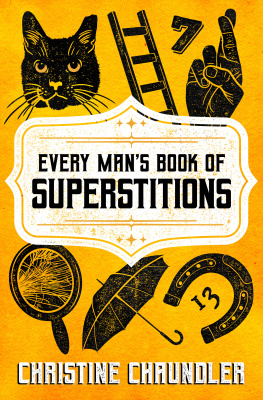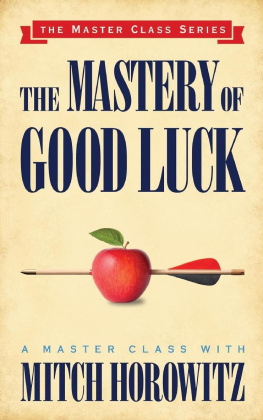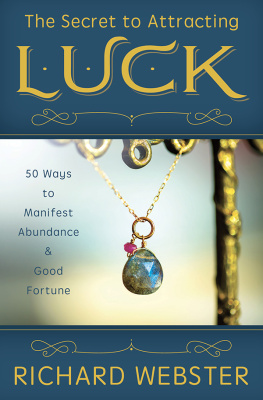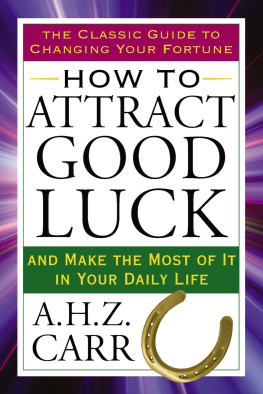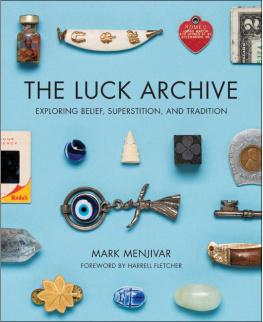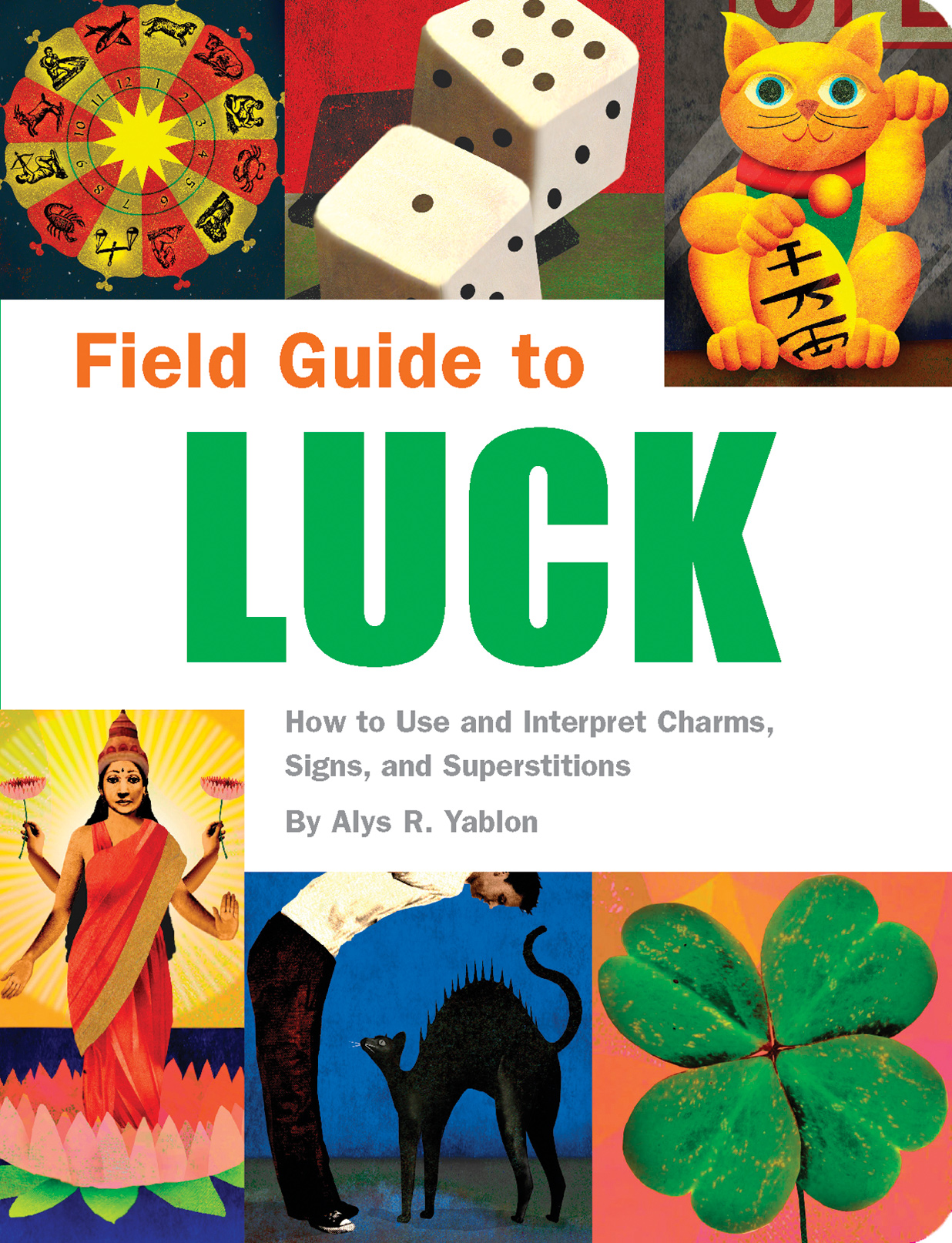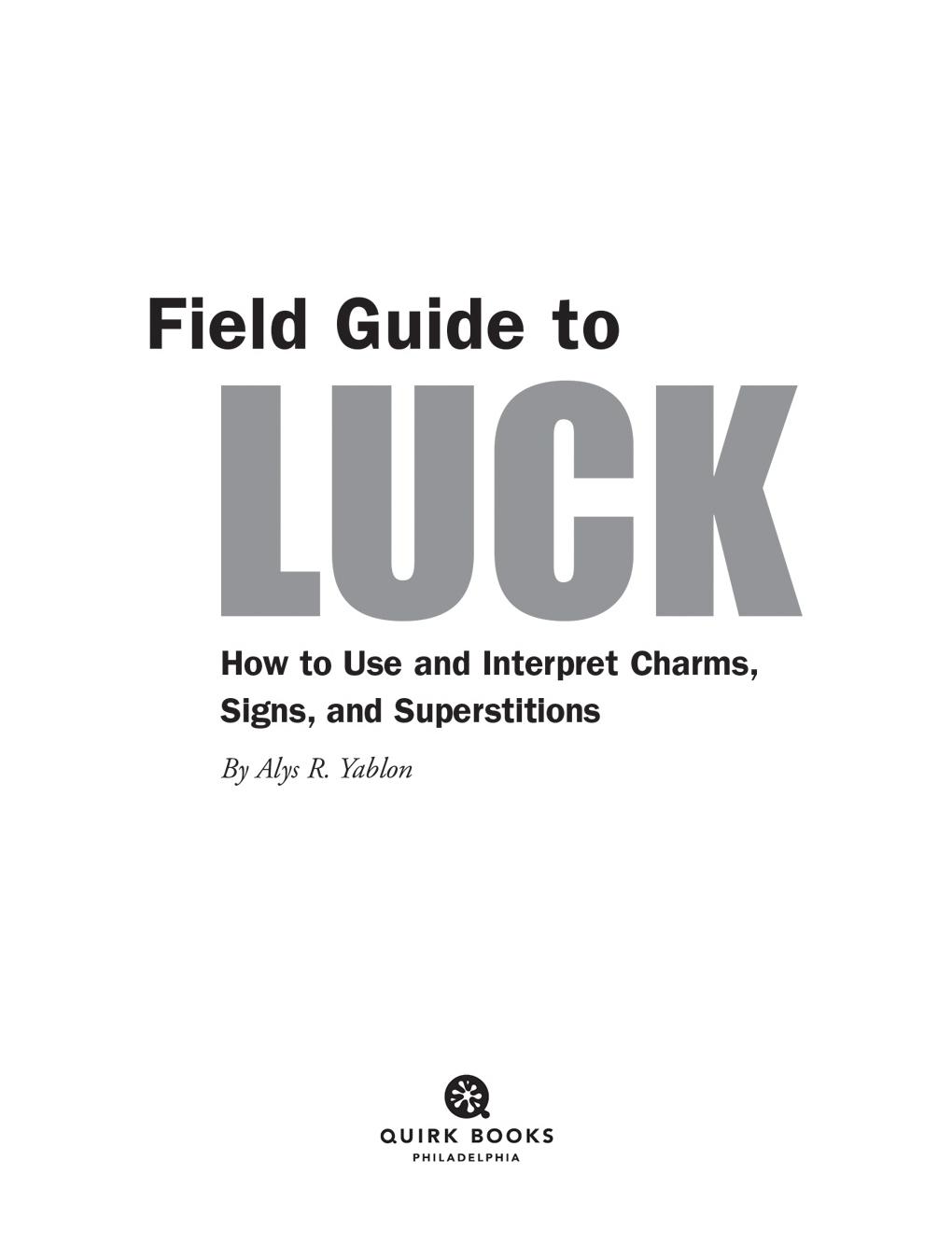DISCLAIMER
The world of luck is wide and varied. Although we have taken care to represent widely diverse superstitions, signs, and charms, the author and the publisher cannot guarantee this guide addresses every possible type worldwide, nor can they accept responsibility for any bad luck brought on by the practices described herein.
Copyright 2008 by Quirk Productions, Inc.
All rights reserved. No part of this book may be reproduced in any form without written permission from the publisher.
Library of Congress Cataloging in Publication Number: 2007937186
eBook ISBN: 978-1-59474-836-3
Trade Paperback ISBN: 978-1-59474-217-0
Designed by Karen Onorato
Illustrations by Brian Stauffer
Iconography by Karen Onorato
Quirk Books
215 Church Street
Philadelphia, PA 19106
quirkbooks.com
v3.1
Contents
Introduction
Luck is believing youre lucky .Tennessee Williams
We all do certain things to enhance our fortune. Whether its wearing a lucky charm, carrying a rabbits foot, or seeking counsel from a Ouija board, superstitious actions make us feel more in control of our fate and help ease the burden of lifes mystery.
In Field Guide to Luck , you will encounter more than ninety charms, superstitions, signs, and numbers that are linked to the concept of luck, both good and bad. You will learn what to avoid and what to embrace; how to reverse curses and other runs of bad karma; and how to bring about health, wealth, and happiness. The entries span vast historical, geographical, and cultural chasms. From ancient Egypt, Greece, and China to contemporary America and Africa, and from astrology and numerology to Judaism, Christianity, and Buddhism, the symbols and ceremonies described within will open your eyes to an astonishing array of elaborate practices.
If you have ever wondered why your grandmother was prone to spit midsentence, why your Uncle Marty throws salt over his shoulder, or why Madonna wears a red string tied around her wrist, the answers lie in the pages ahead. Superstitions as common as avoiding black cats and picking up a lucky penny are explained in their historical and cultural contexts, as are less familiar customs, such as worshipping the goddess Lakshmi, donning an evil eye bead, or placing an acorn in your window. In addition to illuminating the historical origins of various actions and objects, the entries discuss how superstitions relate to our lives today. You never know when you might find an opened ladder in your path or a ladybug on your shoulder, so always carry a copy of Field Guide to Luck just in case.
Superstition
Superstitions are inherently irrational. You cannot scientifically prove that something desirable happened just because you wished for it while watching a shooting star, and there is no way of knowing if garlic truly wards off evil spirits. But two of the most seminal and pervasive forces in our worldnamely, love and religionare similarly irrational. It is impossible to prove the existence of God, just as it is impossible to quantify feelings of love and attraction. Yet religious faith and romantic love are central to so many cultures that they are popularly accepted. Just as we cant explain how a sudden, powerful attraction to a complete stranger can result in the formation of a new family and a relationship that lasts for decades, we cannot always rationalize why we choose to believe in magic, superstitions, or just plain dumb luck.
In the age-old tension between science and religion, superstition has traditionally held a place somewhere in the middle. Medicine men and shamans, sorcerers and witches, priests and Buddhas have all maintained superstitious beliefs and used symbolic objects to heal patients and wound enemies. The Roman Catholic Church has an intimate relationship with all things miraculous, canonizing saints based on their magical healing powers and using ritualized practices, such as rosary beads and prayers, to help alter reality.
We live in a supremely mechanized world, a high-tech, fast-paced environment in which religion is often not the focus. We concentrate on curing illnesses, exploring space, and acquiring the latest technology. For many, formalized religion has taken a backseat to more materialistic pursuits. Yet now more than ever, increasing numbers of people are open to informal faiths that emphasize spiritual experience and psychological awareness. Ancient traditions, from New Age movement and its offspring have created an environment in which people can access a wide range of religious expressions.
Perhaps because of this openness, superstitiononce regarded as outdatedis back in fashion. The plethora of self-help and self-improvement books only solidifies this trend. We are hungry for something to believe in, something that speaks to us beyond science and religion. We are willing to alter our behavior and take novel, sometimes irrational measures to improve our lives and our world.
Lucky
If you could be either inherently lucky or hopelessly unlucky, chances are youd choose the former. Life is filled with ups and downs, and the ups are certainly more fun. So we instinctively look for ways not only to enhance but also to induce those experiences. If you passed a calculus test in high school while wearing your favorite blue T-shirt, you may find yourself donning that top to exams throughout college. Why not? Whos to say it wasnt the comfort and familiarity of the well-worn garment that calmed your nerves and allowed you to focus on the problems you needed to solve to pass the test? And if you once got a flat tire on Friday the thirteenth, and on another such inauspicious date you were fired from your job, you might decide to take that day off in the future, just to be careful.
What many of us would like to know is, How can I be one of the lucky ones? It might be asking a lot to be imbued with the power to pick winning lottery numbers or land a dream job right after graduation, but we all want to get on the right track and enjoy lucky breaks. So how does one achieve good fortune?
Many of the entries that follow will help maximize your chances of getting lucky. Theyll explain how to attract business by placing a money cat in your office window or to ensure that your new marriage is financially viable by placing a coin in your shoe on your wedding day. The bottom line is that luck is chiefly a state of mind. If you feel lucky and go about your daily life with a positive attitude, you will be more likely to stumble upon those opportunities that constitute a luck-filled life. If you want to be lucky, you will be lucky, one of these days.
Psychologist Richard Wiseman, author of The Luck Factor: Changing Your Luck, Changing Your Life , is convinced that getting lucky is a personal choice dependent upon a set of learned behaviors. Even if you were the kind of kid who got picked last for the kickball team and grew up to be the guy who never had much luck with the ladies, you can change your life by embracing certain essential principles. The main strategies are to maximize your chance opportunities, listen to your instincts, expect good things to happen, and find ways to turn bad luck into good. In other words, if you exude positive energy, you will bring about positive change. If you expect good things to happen (and carry a lucky penny in your back pocket, perhaps), they will. If you make an effort to meet lots of people, some of them are bound to help you achieve your goals. By contrast, if you maintain a negative outlook and never maximize your chances to network, you are sure to bring about an unlucky reality. Luck, therefore, is within your control.


